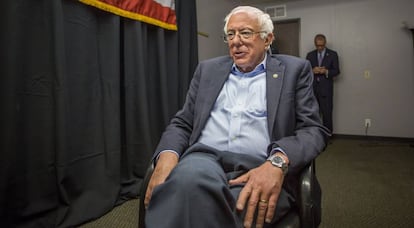Bernie Sanders: “America is suffering and does not trust the establishment”
Democratic presidential hopeful believes he can defeat Clinton in final stretch of nomination campaign


Bernie Sanders says he could not imagine a year ago that Donald Trump would wind up as the Republican nominee in the upcoming November 8 presidential elections. When asked what that development says about the United States, he answers: “It says that the establishment of this country is not respected, that the American people have less and less faith in it. That establishment is the traditional Republican leadership and traditional Democrat leadership, the media...the American people are suffering and do not see the establishment responding...And Trump has basically presented himself as an anti-establishment candidate.”
The 74-year-old Brooklyn native sat down with EL PAÍS moments before he took the stage at Irvine, a city south of Los Angeles. His speeches are full of references to the establishment, big media outlets and corporations. It is his second event of the day; he has been holding two town hall meetings daily since he began focusing his campaign efforts on California, whose 475 delegates makes it the biggest prize in the Democratic primary. Sanders needs to win the state on June 7 if he hopes to pry the nomination away from Hillary Clinton, the favorite in the Democratic race. “It’s not impossible,” he argues, admitting: “It’s a narrow path.”
If I win in a state with 75 percent of the votes, it’s a little absurd that the superdelegates support Secretary Clinton Bernie Sanders
Three things need to happen on that path, Sanders says. “First, in the states where I won an overwhelming majority, we hope that the superdelegates do what the people of that state have asked for, which is to support Bernie Sanders. If I win in a state with 75 percent of the votes, it’s a little absurd that the superdelegates support Secretary Clinton.”
The Democratic Party has 4,763 delegates, 712 of whom are superdelegates, party members who cast the final vote for the nomination at the Democratic National Convention. Superdelegates are unpledged, meaning they are not beholden to the results of primaries and may vote for whoever they choose. The remaining delegates must support the winner of the primaries in their respective states. Superdelegates are usually distinguished party members and lawmakers. In other words, the establishment. According to the latest tally on RealClearPolitics, 525 superdelegates have already declared their support for Clinton, while 39 say they will back Sanders.
“In second place,” Sanders continues, “If we do it well in California and in New Jersey and in the few other states that vote on June 7, we have the possibility of getting 50% of pledged delegates. We now have 46%. We have to work very hard to get it.”
Besides matching Clinton’s pledged delegates and making a good number of superdelegates change their minds, Sanders adds: “We can explain to each delegate at the Democratic National Convention that in every poll I have seen we beat Donald Trump by a much wider margin than Hillary Clinton. In fact, today [Sunday], there was an NBC poll in which we were 15 points above Trump and she was 3 points ahead. So our argument is not trivial.”
Sanders rejects the idea that he could have ended his campaign as most primary candidates do when they only have a slim chance of winning the nomination. He seems upset when asked why he has decided to continue until the last day. “I just told you there was a path to the nomination,” he answers.
Sanders rejects the idea that he could have ended his campaign as most primary candidates do when they only have a slim chance of winning the nomination
And this path has led to California, a huge state whose primary is scheduled late in the season so it does not upset the balance of previous results. This year, Sanders is making it a crucial contest. Over the last two weeks, Clinton has made an impressive show of power by appearing with several Californian Latino leaders including union leaders, immigration activists and politicians like Kevin de León, the president pro tempore of the California State Senate. “Secretary Clinton has had the support of the establishment in every state in the country. We have won 20 states and lost three or four by a hair’s breadth. The fact that the establishment, of any kind, supports Secretary Clinton is not a surprise. It has always been this way. But we have won 20 states. I think we have excellent chances of winning here in California and I think it will go very well for us with the Latino vote.”
Meanwhile, the crowd wants Sanders to come out on stage. There are about 8,000 people in the stadium, nothing like those townhalls he held in Iowa for 20 or so voters. His “political revolution” draws thousands who want to hear him speak and his campaign for universal healthcare and free university studies has put those issues at the center of the political debate in the media. He has forced Clinton to lean further left in her language. Isn’t that already a victory? “No, he insists, victory is winning.”
English version by Nick Lyne.
Sign up for our newsletter
EL PAÍS English Edition is launching a weekly newsletter. Sign up today to receive a selection of our best stories in your inbox every Saturday morning. For full details about how to subscribe, click here.
Tu suscripción se está usando en otro dispositivo
¿Quieres añadir otro usuario a tu suscripción?
Si continúas leyendo en este dispositivo, no se podrá leer en el otro.
FlechaTu suscripción se está usando en otro dispositivo y solo puedes acceder a EL PAÍS desde un dispositivo a la vez.
Si quieres compartir tu cuenta, cambia tu suscripción a la modalidad Premium, así podrás añadir otro usuario. Cada uno accederá con su propia cuenta de email, lo que os permitirá personalizar vuestra experiencia en EL PAÍS.
¿Tienes una suscripción de empresa? Accede aquí para contratar más cuentas.
En el caso de no saber quién está usando tu cuenta, te recomendamos cambiar tu contraseña aquí.
Si decides continuar compartiendo tu cuenta, este mensaje se mostrará en tu dispositivo y en el de la otra persona que está usando tu cuenta de forma indefinida, afectando a tu experiencia de lectura. Puedes consultar aquí los términos y condiciones de la suscripción digital.








































